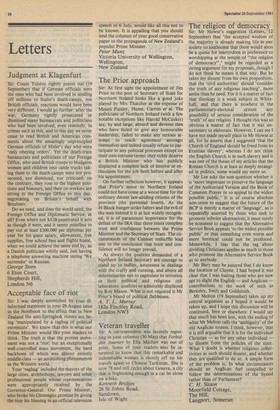The religion of democracy
Sir: Mr Howse's suggestion (Letters, 12 September) that `the accepted wisdom of the majority is already making life in our society so loathsome that there would soon be a queue for martyrdom in preference to worshipping at the temple of "the religion of democracy",' might be regarded as a strong argument for my proposals, though I do not think he means it that way. But he takes my dissent from his own proposition, that the 'civil authorities' should 'consider the truth of any religious teaching', more amiss than he need. For it is a matter of fact that theology is a weak subject in Whitehall, and that there is nowhere in the parliamentary-electoral system any possibility of serious consideration of the 'truth' of any religion. I thought this was so obvious a matter of fact that it was unnecessary to elaborate. However, I can see I have not made myself plain to Mr Howse at all, for he asserts that I suggested 'that the Church of England should be freed from its Erastian slavery', whereas I do not think the English Church is in such slavery and it was one of the theses of my articles that the Roman Church is at least as deeply entangled in politics, some would say more so.
Mr Lee asks the non-question whether it is 'more important to preserve the language of the Authorised Version and the Book of Common Prayer or to appeal to the widest possible public.' It is of course absolute non-sense to suggest that the future of the BCP is merely a matter of 'language', as is repeatedly asserted by those who seek to promote inferior alternatives; it must surely be nonsense to suggest that the Alternative Service Book appeals 'to the widest possible public' or that something even worse and more heretical could not be produced. Meanwhile, I fear that the tag about dividing Christians applies as much to those who promote the Alternative Service Book as to anybody.
,Mr Bury may be assured that I do know the location of Cloyne. I had hoped it was clear that I was baiting those who are now apt to slight the English — and Anglican — contributions to the work of such as Berkeley, Swift and Goldsmith.
Mr Melton (19 September) takes up my central argument as I hoped it would be taken up, and I hope this discussion will be continued, here or elsewhere. I would say that much has been lost, with the ending of what Mr Melton calls the 'ambiguity' of the old Anglican system. I think, however, that it is still arguable that it is for the individual Christian — as for any other individual — to dissent from the policies of the state. What I doubt is whether religious collectivities as such should dissent, and whether they are qualified to do so. A simple form of the problem is, In what circumstances should an Anglican feel compelled to follow the determinations of the Synod rather than of Parliament?
C. H. Sisson Moorfield Cottage, The Hill, Langport, Somerset


































 Previous page
Previous page